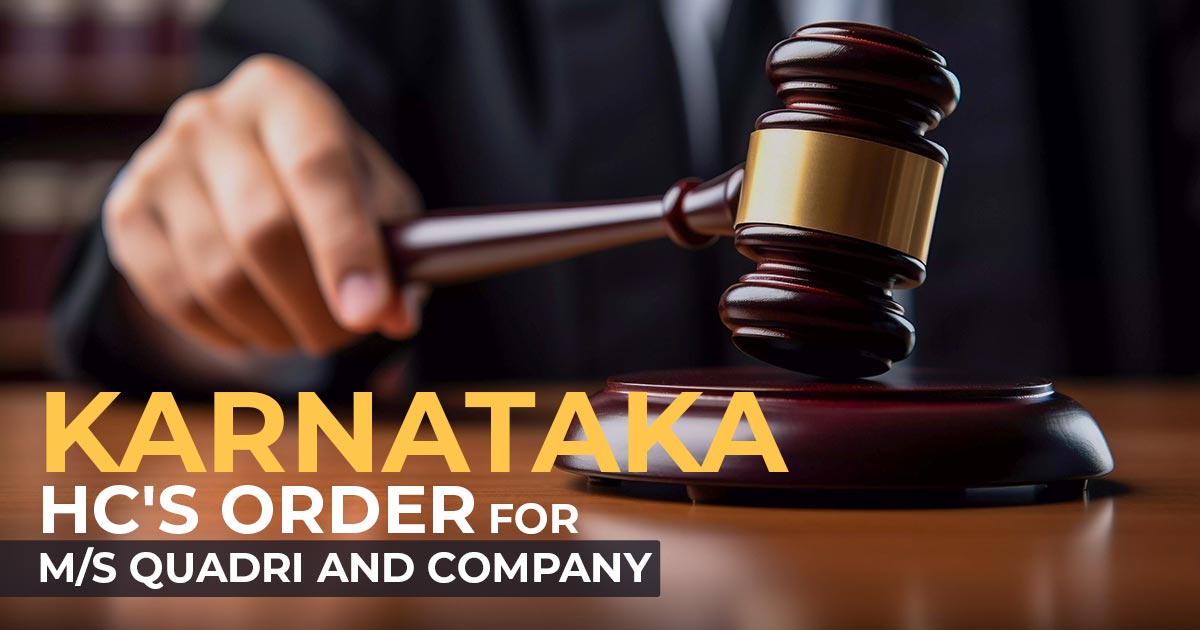
The Karnataka High Court has instructed the department to release the seized goods under certain conditions which are mostly used for Ayurveda medicines. The confiscation occurred because of a failure to submit the E waybill. The bench altered the conditions initially set by the single judge.
M/S Quadri and Company, the petitioner, submitted a petition to overturn the interim rulings made in the writ petitions. These orders were supposedly based on a reevaluation of the transaction value by the Assistant Commissioner of Taxes.
The appellant has requested the commissioner of commercial taxes to issue new orders regarding the legality and validity of reevaluating the transaction value. They’ve also asked for directions to release the consignment and conveyance, proposing to pay 20% of the imposed GST penalty as a deposit, secure the remaining consignment value via a bank guarantee based on the tax invoice, and reserve discussion on the reevaluation of the transaction value for a statutory appeal.
Counsel for the appellants, including Sri. Bharat Raichandani, Advocate for Sri-Gangadhar S.Hosakeri and Sri.D.M.MalIi, Advocates, highlighted the petitioner’s primary concern: the stringent condition set by the Single Judge for releasing the goods should be revised.
The petitioner had invoiced the consignee for supplying the particular goods and handed over the goods to a transporter. The Assistant Commissioner of Commercial Taxes (Enforcement) intercepted the conveyance hired by the transporter to transport these goods.
After a physical inspection, an order of detention under section 129 of the GST Act was issued, holding back both the conveyance and the goods.
CAMPCO’s assessment reported that the goods were undervalued. Before the completion of proceedings under section 129, a confiscation notice was purportedly issued, followed by a confiscation order.
The order was contested through an appeal under section 107 of the Act, and certain payments were made after the dismissal of that appeal. Subsequently, another appeal was lodged, resulting in an order under the KGST Act.
The petitioner’s counsel argued that initiating proceedings under section 129 couldn’t have been abandoned midway, insisting that proceedings for confiscation under section 130 of the Act shouldn’t have been pursued. They further argued that the imposed conditions were burdensome and that the consideration of imposing conditions based on the value of goods was irrelevant.
The issue concerning the legitimacy of the order under section 130 of the Act remains under consideration by the learned Single Judge. While the petitioner’s counsel argued that conditions should only pertain to tax and penalty, excluding any association with the value of goods, this argument isn’t deemed acceptable.
Section 130 proceedings in the Act revolve around the confiscation of goods, and if these actions are validated, ownership would transfer to the revenue, allowing them to sell the goods and use the proceeds.
A division bench comprising Justice S Sunil Dutt Yadav And Justice Vijaykumar Aspatil modified the interim order on 25.09.2023 passed by the Single Judge as follows
- The appellants are required to fulfil the 25% deposit specified in the appeal proceedings concerning the challenged order in the writ proceedings. It’s clarified that any deposits made by the appellant in earlier appeals could be accounted for and adjusted.
- The appellants must settle the tax and penalty as outlined in the orders contested before the learned Single Judge, securing the amount through a bank guarantee.
- The appellants must provide a bank guarantee corresponding to the value of goods stated in their invoice.
- The appellants need to provide a personal bond from the proprietor, representing the appellants, covering the difference in value between the goods as per the appellants’ invoice and the valuation determined by CAMPCO on behalf of the State.
| Case Title | M/S Quadri and Company vs Commercial Tax Officer |
| Case No. | Writ Appeal No. 100629 of 2023 |
| Date | 19-12-2023 |
| Karnataka High Court | Read Order |